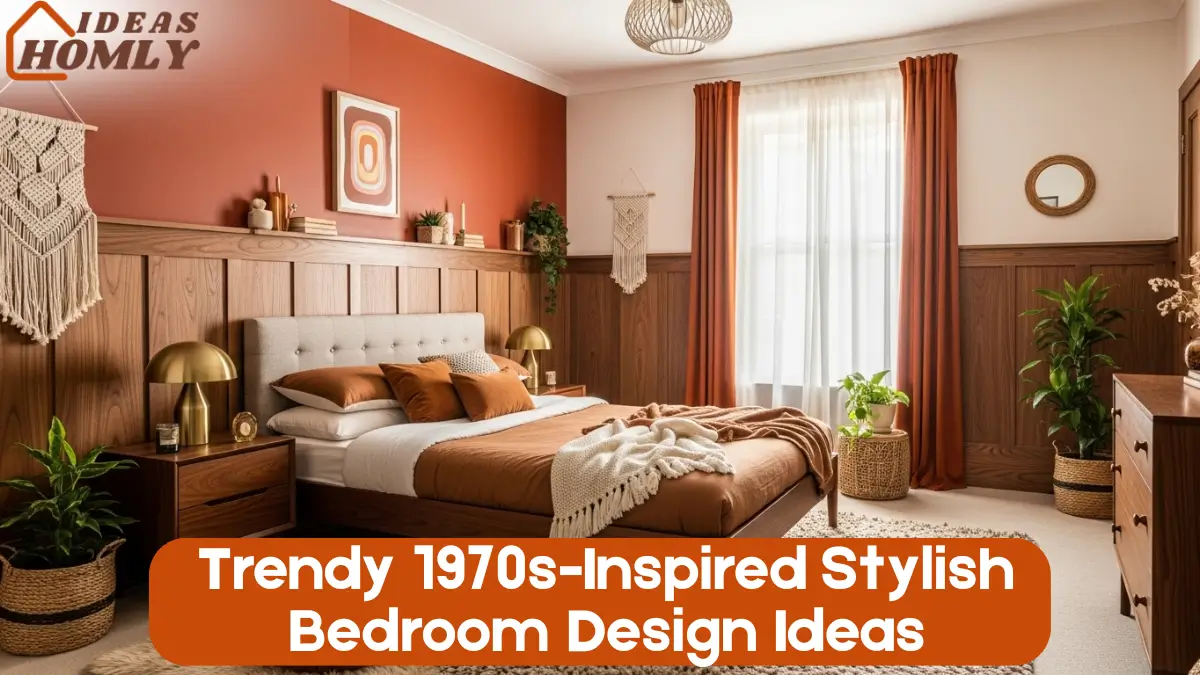I’ve always been drawn to the warmth, charm, and slightly rebellious spirit of 1970s home design. Lately, I’ve noticed this retro vibe making a big comeback in bedrooms and honestly, I’m not surprised.
If you’ve ever wanted to mix comfort, character, and a bit of playful personality into your sleep space, this nostalgic trend is your dream come true.
So if you’re wondering, how do I design a bedroom with 1970s style that doesn’t look like a thrift store exploded? Don’t worry. I’ve got you.
Why 1970s Style is Trending Again in Bedroom Interiors
Let’s be real: minimalist bedrooms had their moment, but they can feel cold and impersonal. The 1970s, on the other hand, bring life, texture, and warmth into your space. And honestly? That’s what most of us need right now a room that feels lived-in, not staged.
Retro design hits a sweet spot between vintage charm and cozy comfort. It’s not about cluttering the space with old furniture. It’s about choosing meaningful textures, rich tones, and funky accents that tell a story.
With rising interest in sustainable decor, the 70s’ love for natural materials, second-hand pieces, and plants aligns beautifully with today’s values.
Here’s what I love most about this look:
- It’s warm and inviting, not sterile
- You can mix in modern touches without losing its charm
- It’s budget-friendly if you thrift or DIY (which, let’s face it, is half the fun)
Now, let’s get into the juicy part: four stylish, well-balanced bedroom ideas inspired by this bold decade.
1. Go Earthy with 70s Color Palettes and Wood Paneling
I swear by color when it comes to setting the vibe of a room and the 70s nailed it. Think warm terracotta, mustard yellow, avocado green, burnt orange, and chocolate brown. These earthy tones instantly create a cozy, grounded feel.
Back in the day, wood paneling was everywhere. But no, I’m not talking about the cheap, plastic-looking kind. I mean rich walnut, rustic oak, or even reclaimed wood that adds character and warmth.
Here’s how I’ve used this in my own bedroom:
- I painted one accent wall in rust orange, paired with warm white for balance.
- I installed DIY wood slats behind my bed for texture; cheap, easy, and so satisfying to look at.
- My bedding includes shades of brown and cream with woven throw blankets for extra comfort.
And trust me, these colors glow in soft lighting at night. It’s like your room gives you a warm hug every evening.
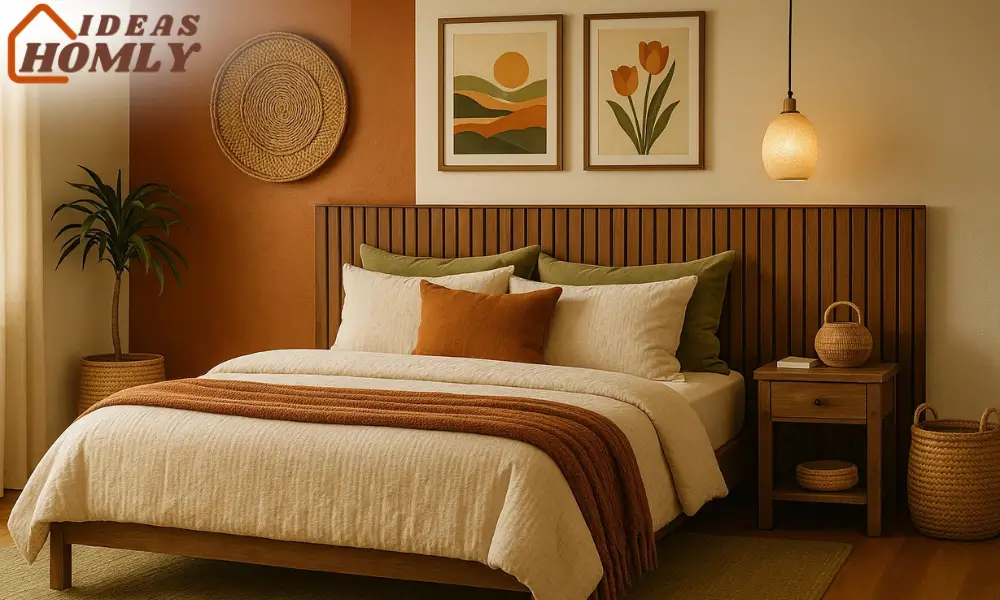
Color Combo Inspiration
| Primary Color | Accent Color | Wood Tone Suggestion |
|---|---|---|
| Burnt Orange | Olive Green | Walnut |
| Mustard Yellow | Deep Brown | Teak |
| Avocado Green | Beige/Off-White | Oak |
| Rust Red | Cream | Reclaimed Pine |
Now, if you’re not ready to go full retro, you don’t have to redo the whole room. A wood-paneled headboard or some thrifted mid-century furniture in warm wood finishes does the trick.
Pro tip: Add woven wall baskets or vintage-style prints to play off the color palette. It ties everything together beautifully without feeling overdone.
2. Embrace Shag Rugs and Plush Retro Textures
I won’t lie there’s nothing quite like sinking your feet into a thick, fluffy shag rug the moment you roll out of bed. It’s one of those small joys that make a big difference. And guess what? Shag is back, and it’s better than ever.
Back in the 70s, texture was everywhere. From velvet bedding to chunky knit throws, every element added a cozy layer to the room. That’s why embracing texture is key when trying to nail the retro bedroom aesthetic.
In my own setup, I started small:
- A soft cream-colored shag rug beside the bed
- A velvet olive green cushion on my chair
- A tufted headboard for that plush, sink-in feeling
Mixing and matching textures helps the room feel dynamic, not flat. I like pairing corduroy with leather, or linen sheets with a faux fur throw. It sounds wild, but it totally works.
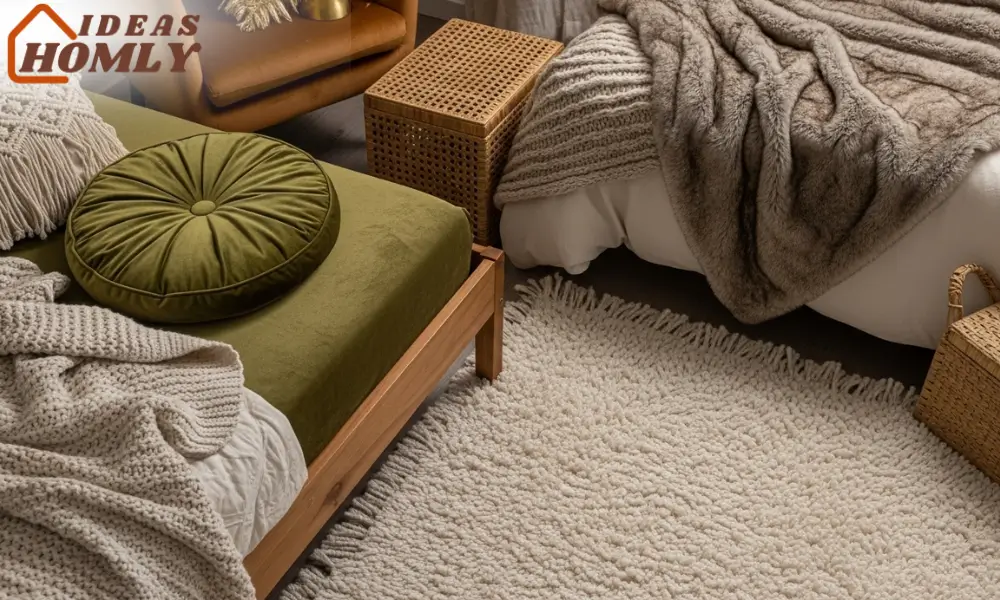
Retro-Inspired Textures You Can Layer In
| Texture Type | Best Used For | 70s Feel Level |
|---|---|---|
| Shag | Rugs, cushions | High |
| Velvet | Pillows, bedding, armchairs | Medium-High |
| Rattan/Wicker | Storage baskets, chairs | Medium |
| Macramé | Wall hangings, plant holders | High |
| Faux Fur | Throws, accent pillows | High |
| Corduroy | Upholstery, cushions | Medium |
Just keep balance in mind. Too many textures and your bedroom might start to feel like a vintage clothing store. I usually limit it to three main textures, repeating them throughout the room so it feels intentional.
Also, don’t be afraid of a little glam. Retro bedrooms often included mirrored furniture, gold finishes, or fringe details all of which add a playful, tactile touch.
3. Add Statement Lighting with Curved Brass Fixtures
Alright, now let’s talk about lighting aka the jewelry of your room. If you want to make a statement without doing a full redesign, lighting is your best friend.
In true 70s fashion, brass and gold-toned fixtures ruled the scene. From arched floor lamps to bulbous sconces, the goal was to create soft, glowing, ambient light that made everything look just a bit more magical.
I added a curved brass lamp to my reading nook, and suddenly it felt like I’d stepped into a retro movie set. Not only does it look amazing, but the warm-toned bulb gives my room the kind of glow that’s honestly flattering at any hour.
Here’s what works really well with the retro theme:
- Curved arc lamps with globe bulbs
- Sputnik chandeliers (yes, they still look cool!)
- Table lamps with mushroom-shaped shades
- Wall sconces in brushed brass or antique gold
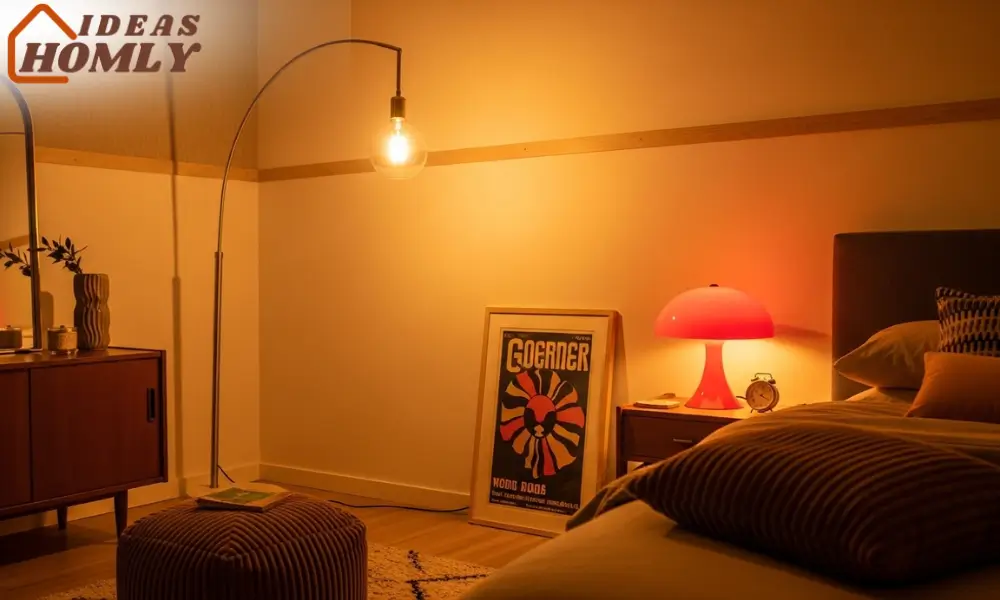
Lighting Options That Scream 70s
| Fixture Type | Where to Use | Pro Styling Tip |
|---|---|---|
| Arched Floor Lamp | Beside reading chairs | Pair with shag rug and pouf |
| Globe Pendant Light | Above bed or dresser | Use warm LED bulb |
| Brass Wall Sconces | Near headboard | Match with metallic frames |
| Mushroom Table Lamp | On nightstands | Choose bold colors (orange, red) |
Lighting is also a great way to mix modern with retro. I often suggest choosing a sleek modern bulb for an old-school base, or vice versa. That way, the bedroom doesn’t feel stuck in time.
And trust me, once you switch out your overhead light for a soft-glow globe pendant? You’ll never go back.
4. Decorate with Macrame and Indoor Plants
If there’s one thing I’ve hoarded over the years (other than throw pillows), it’s macrame. Nothing says “70s bedroom” quite like a handmade macrame wall hanging. It adds that handcrafted, bohemian vibe without trying too hard.
Macrame art was everywhere in the 1970s often used as a focal point above beds, as curtain accents, or in plant hangers. I personally love it because it brings texture to the walls and balances the clean lines of furniture.
Speaking of plants yes, you need them. The 70s were basically a jungle decade when it came to home decor. I’m talking about hanging spider plants, towering fiddle leaf figs, and clusters of pothos in woven baskets.
Why I love this combo:
- It’s affordable and easy to maintain
- Plants purify the air (your sinuses will thank you)
- Macrame adds softness without bulk
Here’s what works best in a 70s-inspired bedroom:
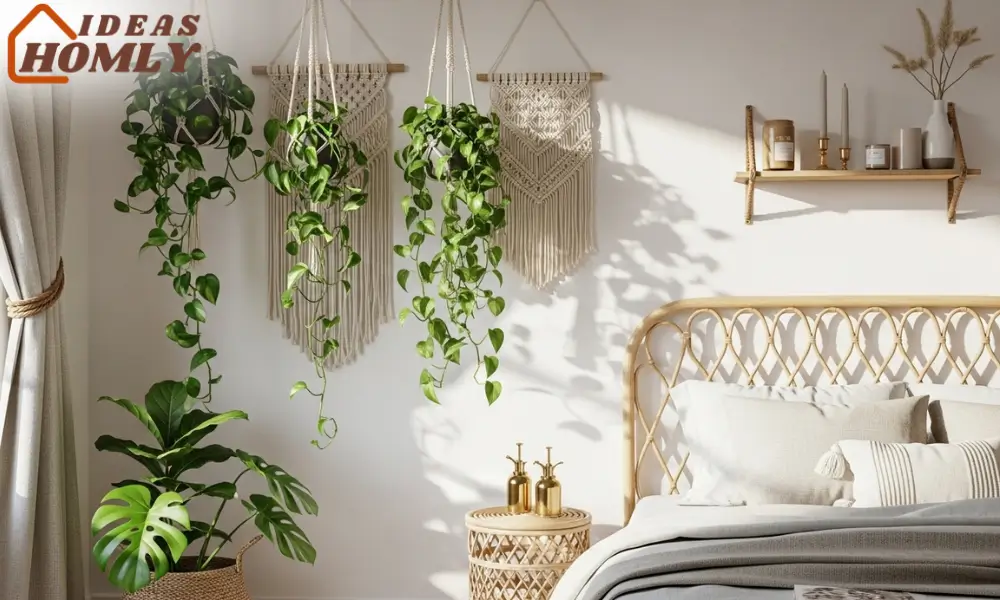
Best Indoor Plants for That Retro Look
| Plant Name | Style Vibe | Light Needs | Styling Idea |
|---|---|---|---|
| Spider Plant | Classic retro | Low to medium | Hang in macrame near window |
| Snake Plant | Sleek + bold | Low light | Place in a brass planter |
| Pothos | Cascading softness | Medium light | Let trail off a shelf or sconce |
| Monstera | Statement-making | Bright indirect | Corner piece in woven basket |
Combine your greenery with handmade textures, like a macrame curtain tie or wall hanging, and you’ll have a bedroom that feels earthy, calm, and totally Pinterest-worthy.
How to Modernize Your Retro Bedroom Without Going Overboard
I get it, nobody wants to live in a museum. The key to pulling off 1970s-inspired decor in 2025 is balance. You want to keep the vibe, but still make it feel clean, updated, and personal.
Here’s how I strike that balance:
- Limit the color overload: Stick to 2-3 earthy shades and layer neutrals around them. Too much orange and green can get chaotic fast.
- Choose modern furniture with retro finishes: A sleek bed frame in walnut or a nightstand with vintage-style legs? That’s the sweet spot.
- Use retro pieces as accents, not anchors: Let your 70s finds (like lamps or rugs) be highlights, not the whole show.
- Mix in modern art or tech elements: I paired a rattan side table with a wireless charging lamp looks retro, functions 2025.
My motto? Let the room feel inspired by the 70s, not stuck in them. It’s all about blending nostalgia with today’s comfort and function.
Conclusion
I’ve always loved how 1970s design manages to feel relaxed, personal, and a little rebellious. It’s not about perfection, it’s about vibe.
By using the right color palette, embracing texture, playing with lighting, and adding a touch of greenery, you can turn your bedroom into a cozy, stylish retreat that feels both retro and timeless.
Whether you’re going all in or just sprinkling in the details, one thing’s for sure: that groovy 70s charm still knows how to make a space feel like home.
FAQs
Absolutely! In fact, combining styles is the best way to make your space feel personal. I often mix 70s elements like shag rugs and brass lamps with boho textures or modern minimalist furniture. Just make sure your color palette stays consistent so it doesn’t feel chaotic.
Start small with accessories. Grab a vintage-style lamp, a bold throw pillow, or a secondhand shag rug. Check local thrift stores or Facebook Marketplace, you’d be surprised how many gems are out there. Plants and macrame are also budget-friendly and high impact.
Stick to warm earthy tones like burnt orange, olive green, and deep brown. Pair them with off-whites or warm neutrals. I always suggest testing swatches on your wall first, lighting can change everything. Keep it to 2-3 bold tones max to avoid visual overload.
Definitely but it’s had a glow-up. Modern wood paneling is sleek, often vertical, and used more as a feature than wall-to-wall. I used wood slats as an accent behind my bed and it gave me that warm 70s vibe without making the room feel dated. Go for natural or warm stained wood tones to keep it timeless.

